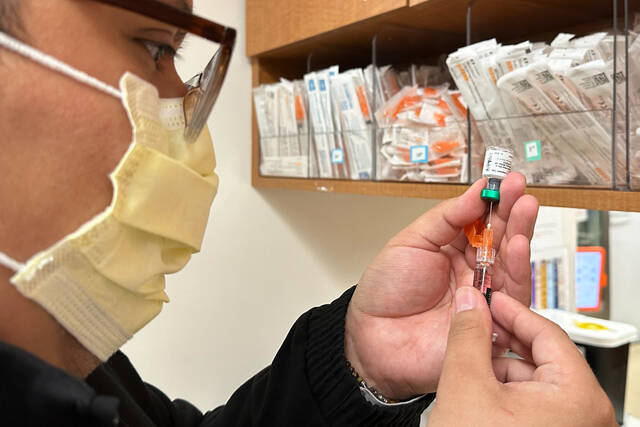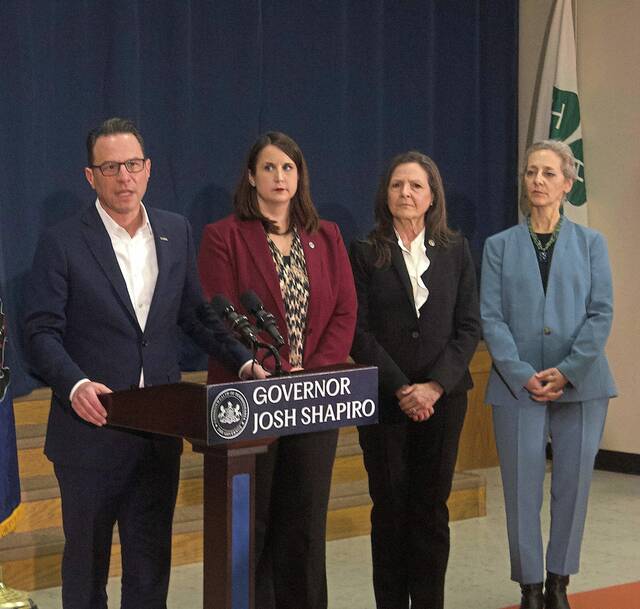Tuesday night’s U.S. Senate debate between Democrat John Fetterman and Republican Dr. Mehmet Oz figures to be remembered mostly for how one candidate spoke instead of what either candidate said.
The hourlong debate at the WHTM-TV studio in Harrisburg covered key issues such as inflation, fracking, minimum wage, abortion, international relations and crime.
Yet, it probably will be remembered for Fetterman’s speaking struggles and the candidates’ nonstop attacks.
Because Pennsylvania’s U.S. Senate race could determine the balance of power in Congress, the debate garnered a lot of attention from national media, political groups and policy advocates. It is the race’s only scheduled debate.
Here are some key takeaways from the debate.
Fetterman speech struggles
The debate featured closed captioning for the candidates, a condition agreed upon in advance because Fetterman has auditory processing issues caused by a stroke he suffered in May.
Fetterman addressed his stroke recovery during his opening statement, but he also stumbled and struggled with his speech and said, “Good night, everyone,” instead of the typical greeting of, “Good evening.”
The struggles continued with Fetterman missing some words and frequently failing to string together long sentences. He appeared to do a better job of expressing himself toward the end of his longer responses.
Alison Dagnes, a political science professor at Shippensburg University, said Fetterman didn’t have a good debate. She acknowledged that Oz had an upper hand from the start because of his extensive television experience.
“Sixty seconds of TV for a TV celebrity is gold, but 60 seconds for someone who needs some time to process is much harder,” she said.
Sam DeMarco, chairman of the Republican Committee of Allegheny County and an Oz supporter, was more critical.
Related
• Editorial: Did Fetterman-Oz debate change any minds?• National reaction: Fetterman's health takes center stage at debate with Oz
• Fetterman, Oz face off in chaotic debate
“I don’t want to dance about this, Fetterman did a terrible job,” he said. “I hope that when this is all over that he can fully recover from his stroke.”
DeMarco said Fetterman’s speech issues were likely worse than people were expecting, and that he froze on a number of questions. He said these struggles could turn off undecided voters and likely will raise more questions about why Fetterman hasn’t released his full medical records.
Fetterman said during the debate that he is prepared for the demands of being a senator, even as he continues to recover from the stroke. He refused to say whether he will release his full medical records, but pointed to an Oct. 19 letter from his doctor that said Fetterman had no adverse effects on his “cognitive ability” and is fit to serve in public office.
Independent experts consulted by the Associated Press said Fetterman appears to be recovering well.
Fetterman campaign spokeswoman Emilia Rowland said the format was a disadvantage to Fetterman, and the time lag necessary for him to read and respond to attacks made it more difficult for him to issue rebuttals. Candidates were given 15 seconds to respond to attacks.
“The time lag was a massive problem, especially with only 15 seconds of rebuttal,” said Rowland. “It could never work. There is no way that anyone could pull off a decent answer in the last five seconds.”
She acknowledged that Fetterman was not a strong debater even before his stroke, and said he won the primary election after subpar debate performances because “he was able to connect with voters on the campaign trail.”
Morgan Overton, vice chair of the Allegheny County Democratic Committee and a Fetterman supporter, said Fetterman performed better than he did in the primary debates and added that some viewers will relate to his health struggles.
“People resonate with the fact that Fetterman is just like us in general,” Overton said.
Policy took a back seat
Dagnes said voters typically tune into debates to hear more nuanced policy positions from the candidates, but Tuesday’s debate didn’t provide much of that.
There were some noticeable contrasts, such as Fetterman expressing his support for a federal $15 minimum wage bill and Oz saying he believes market forces are already raising wages.
DeMarco said it is the nature of debates to try to contrast with your opponent as much as possible.
Both candidates dodged opportunities to elaborate on positions, specifically their support for natural gas drilling.
Oz and Fetterman said they have always supported fracking — and dodged questions about their past statements opposing it.
Dagnes said from a policy angle, the debate was not very beneficial. She said the constant attacks from Oz and Fetterman might have turned potential voters off.
“I came away thinking, gosh, now I know why people don’t vote,” she said.
Possible buyers’ remorse
DeMarco said Democrats would have been better off replacing Fetterman after his stroke.
“I think people are having buyers’ remorse,” said DeMarco. “The debate was a disaster for the Democrats and the Fetterman campaign.”
But Overton said Fetterman showed courage going on the debate stage, even though he is still recovering from a stroke, and that voters were reminded why they support Fetterman because of his answers on abortion and tackling corporate greed.
“He may stumble with his words, but what was incredibly clear to me was that he will protect abortion rights, working-class families, and will ultimately be the 51st vote needed to make President Biden’s agenda a success,” she said.
Oz on abortion
While Fetterman’s speech issues likely will stick with voters, Fetterman’s campaign is already trying to seize on what it sees as a gaffe by Oz.
During the debate, Oz said, “I want women, doctors, local political leaders, letting the democracy that has always allowed our nation to thrive, to put the best ideas forward so states can decide for themselves.”
The Fetterman campaign said it has cut an ad with this soundbite and will try to use it to tie Oz to Republican gubernatorial candidate Doug Mastriano, a state senator who has said he opposes any abortions, even in the case of rape or incest.
“The point that we are making is Oz believes abortions should be made by local political leaders like Doug Mastriano,” Rowland said. “That is going to end up being the damning moment for Oz.”
Who watched?
Duquesne University political science professor Lew Irwin said there appeared to be a lot of national attention on Tuesday’s debate, but he is unsure how many Pennsylvanians actually tuned in. Ratings information for the debate have not been released.
Irwin said Senate debates typically don’t matter much and that for the vast majority of voters, the debate isn’t going to change their minds.
“These moments in debates tend to get a lot of attention but don’t actually sway elections, especially in a polarized electorate,” Irwin said.
However, with such a close race, Tuesday’s debate might be the rare instance where it changes enough minds to tip the scales.
A recent CNN poll said 91% of likely voters have made up their minds for the Senate race, with 9% undecided. That poll had Fetterman with a 51% lead compared to 45% for Oz.
A recent CBS/YouGov poll showed Fetterman leading 51% to Oz’s 49%.
“For the great majority of voters, this will not change their vote, but even if it just ticks a little bit of the electorate, it could tip the race for Oz,” Irwin said.








